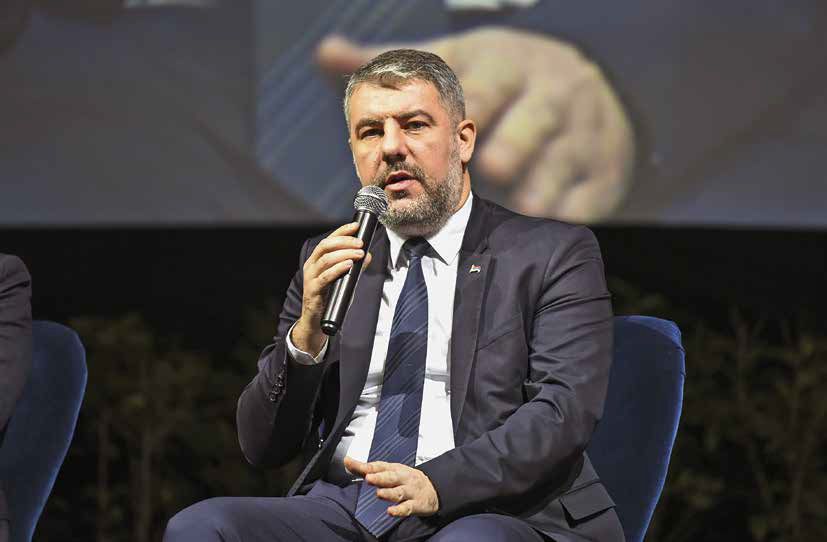The Republic of Srpska has made significant breakthroughs in creating an incentivized business environment, especially in the segment of harmonization with the standards of the European Union. In addition, the Government of the Republic of Srpska supports the work of the businesstechnological incubator ‘Innovation Centre Banja Luka’, which is occupied mainly by IT companies.

How did digital technologies change the way public sector communicates and did they expedite business operations?
The Government of the Republic of Srpska has recognized the importance of information technologies through the Strategy of Scientific and Technological Development. In cooperation with private companies, we want to identify the potential for export of IT services. The Republic of Srpska has made significant breakthroughs in creating an incentivized business environment, especially in the segment of harmonization with the standards of the European Union. In addition, the Government of the Republic of Srpska supports the work of the business-technological incubator ‘Innovation Centre Banja Luka’, which is occupied mainly by IT companies. We can confidently say that Banja Luka, and I hope some other towns soon, will become recognized as so-called smart cities and create attractive export products for the global market.
How do you view the current situation regarding the technological advancement in the region, and how much do we lag behind other European countries?
A lot of work needs to be done in that respect – organization-, legislation- and planning-wise. The Ministry of Science and Technology cannot be the only body engaged in this, but other government ministries need to get involved too. Science is present in all segments of life. The most important thing is to improve the quality of scientific research, and when that is done, the result is international visibility which is very important, because then you have the opportunity to invite others to work in various research teams and you are given an opportunity to learn. This has both political and socio-economic importance and we can contribute to the momentum in this area in the Republic of Srpska.
What are your ministry’s plans for the next 5 years in terms of implementing innovative technologies?
Information and communication technologies have to be treated as a serious business branch that can, in an incentivized business environment, create products or services for the global market. The Republic of Srpska has made significant progress in creating an adequate business environment. The legal framework is, to a considerable degree, aligned with the requirements of the European Union, the Agency for Information Society of the Republic of Srpska and the JU Academic and Research Network of the Republic of Srpska – SARNET are functioning, and in 2016, the Microsoft Innovation Center (MIC) was established in cooperation with Microsoft. Nevertheless, further efforts are needed in the development of the ICT sector, especially in the field of human resources. Despite the strong demand for experts in this field, there are not enough skilled workers in the labour market without whom it would not be possible to make the necessary steps in this area. Research shows that the ICT sector is closely related to innovation in other areas, i.e. the use of human and technological ICT resources has a direct impact on the development of an innovative environment. Software is increasingly becoming an integral part of non-technological products and processes, which, in the era of the Internet of Things and the Internet of Everything, is gaining on importance.
I would also like to mention the term smart specialization. Namely, the development of high-tech and highly competitive companies implies specialization and investment in research and development. Through smart specialization, the cooperation between certain segments of the economy and scientific research organizations is promoted in accordance with the existing capacities, plans and development strategies, and the expected worldwide trends. If properly used, smart specialization can serve to identify our potential and build emerging industries that can ensure the wider branding of the Republic of Srpska. Smart specialization is a key element of the EU cohesion policy by the year 2020 as it affects the level of consumption and stimulates research and innovation activities. In the context of the Republic of Srpska, our focus is on highly profitable, fast-growing branches of the economy.
Could you please cite a few projects that you realized in the previous period, which were significant for economic growth and sustainable business?
The main task of the Ministry of Science and Technology of the Republic of Srpska is to direct, supervise, encourage and support the development of the scientific, higher learning and technological development sector. This is basically the basis of socio-economic and human progress and the factors for fulfilling the prerequisites for the development of a knowledge-based society in the Republic of Srpska. Over the past four years, the Ministry has allocated around 7 million KM for the development of science and technology in the Republic of Srpska through its programme and project activities. Since 2007, about 10 million KM was invested in supporting young talented students, under the auspices of the Dr Milan Jelić Foundation.
The Ministry’s priority is creating conditions for advancing science through boosting the quality of scientific research work, raising the level of cooperation between science and economy, and supporting young talented researchers. The way to achieve this is to realize the idea of ‘Five Is’, a concept that determines the directions for scientific development, namely institutional development, internationalization, interdisciplinarity, excellence and innovation.